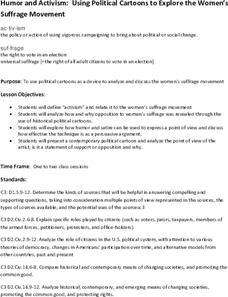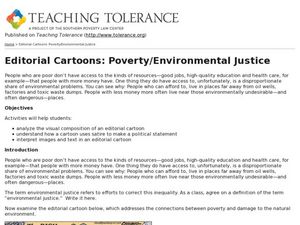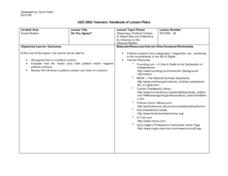Curated OER
Fighting Fire With Satire
Students consider satire in the news by exploring various sources of "fake news," and then creating their own political satire in the form of a skit, news article, or cartoon.
iCivics
Mini-Lesson: Presidential Succession
Who is in line for the presidency? Learners research the line of succession in the executive branch. They analyze the role the cabinet plays in a situation where the president and vice president are not able to serve. Along the way,...
Curated OER
Politics and Religion in 17th Century Dutch Art
Seventh graders examine different pieces of Dutch Art. They identify its social and political meanings by using cultural and historical information. They examine maps of the time period as well.
Curated OER
Comedy Across the Curriculum
The New York Times Learning Network provides the resources that permit pupils to examine and then write and perform a fake news broadcast in the vein of “The Daily Show” or “Saturday Night Live” Weekend Update. The generated reports...
Curated OER
Political Cartoons
Students analyze and interpret political cartoons, then use this knowledge to create their own.
Curated OER
Redistricting: Drawing the Lines
Difficult redistricting concepts are covered in a context that will make it understandable to your government scholars. They begin with a KWL on the term redistricting and then watch a video to answer some questions. They analyze...
Curated OER
Creating Civic Awareness Through Artistic and Literary Forms
Interpret current events using editorial cartoons and other print media. Middle schoolers explore the meanings of literary and artistic terms such as satire, irony, and caricature. They visit internet sites to develop an understanding of...
Curated OER
Cartoons and Protest
Students examine political cartoons from 1774 through today, determine their meanings through analysis and discussion, and create their own political cartoons focusing on historical issues studied in class.
Curated OER
SATIRE AND POLITICS
Students, after analyzing a satiric song written during the Prohibition era, illustrate how humor can be utilized as a political tool by writing satiric lyrics on a current political issue at the front of the news world today. They...
Curated OER
Political Cartoons as Part of the Election Process
Students explore the impact of political cartoons on American elections. In this presidential elections lesson, students discuss the election process and then analyze political cartoons that were published during presidential elections....
National Woman's History Museum
Humor and Activism
As part of their study of the women's suffrage movement, groups analyze political cartoons and drawings. They create a caption for an image from the time, add an exhibit label that provides a context for their drawing, and post as part...
Curated OER
Historical Witness: Social Messaging
Students create political cartoons that feature satire. In this political cartoon lesson, students examine examples of satire and caricature prior to creating their own political cartoons that feature the French Revolution or Industrial...
Curated OER
Editorial Cartoons: Poverty/Environmental Justice
Students analyze political cartoons. In this political cartoon lesson, students analyze an editorial cartoon to develop an understanding of the historical context, symbolism, visual composition, and satire of the cartoon regarding...
Curated OER
Do You Agree?
High schoolers recognize bias in a political cartoon, evaluate how the media uses both positive and/or negative political cartoons, and assess the influence a political cartoon can have on a person.
Curated OER
Political Cartoons: Thinking Broadly, Communicating Succinctly
Students think broadly about the tsunami disaster and its aftermath through studying cartoons. Students critically think about the literary devices the authors/artists use, such as satire, metaphor and personification.
Council for Economic Education
Jokes, Quotations, and Cartoons in Economics
Humor offers a great tool teach the basics of economics to scholars via video clips, satire, and political cartoons. Individuals create their own economic humor to present to the class—with the assistance of Daryl Cagel's online...
Curated OER
Mark Twain: Straddling the Civil War
Mark Twain's life, politics, writing, and role as a mirror of pre- and post-Civil War American culture are the focus 11th and 12th graders in this section from an expansive author study. A critical writing assignment comparing Twain to...
PBS
Mark Twain: Storyteller, Novelist, and Humorist
Scholars investigate the use of satire in Mark Twain's writing. Literary lovers research the Adventures of Huckleberry Finn and Tom Sawyer, political cartoons, and videos to see how Twain uses satire to make the stories more memorable....
Curated OER
Manifest Destiny and Westward Expansion
Students explore the economic, political, racial, and religious roots of Manifest Destiny. They read articles and analyze how the concept influenced the nation's westward expansion. Students discover the motivations and expectations of...
National Endowment for the Humanities
Nathaniel Hawthorne and Literary Humor
Young scholars examine Nathaniel Hawthorne's style of humor and compare it to other humorists. They discuss the purpose of literary humor and determine how it develops characters and plots in stories. They analyze the use of different...
Curated OER
The New Statesman (1987-1992)
Pupils study the work of the House of Commons and consider the importance of debate in the legislative process. They consider why politics is a popular subject for television sitcom and other formats. They explore the four main...
Curated OER
Carnival Celebrations: Masks and Vejigantes
Students explore Carnival. In this Puerto Rico Carnival lesson, students discover the history of the cultural celebration as well as the significance of the elaborate masks worn for the festivities. Students create their own Carnival masks.
Center for History Education
How Did the Public View Women’s Contributions to the Revolutionary War Effort?
Calling upon the legacies of Joan of Arc, Elizabeth I, and Catherine the Great, Esther Reed rallied Southern women to support the American Revolution. Using a broadside by Reed and other primary sources, such as poetry, young historians...
What So Proudly We Hail
A Lesson on Benjamin Franklin’s “Project for Moral Perfection”
Benjamin Franklin identified 13 virtues that he felt would strengthen his character if he could focus on each one. A thorough lesson plan explores high schoolers' personal values in the context of their lives, and compels them to strive...

























